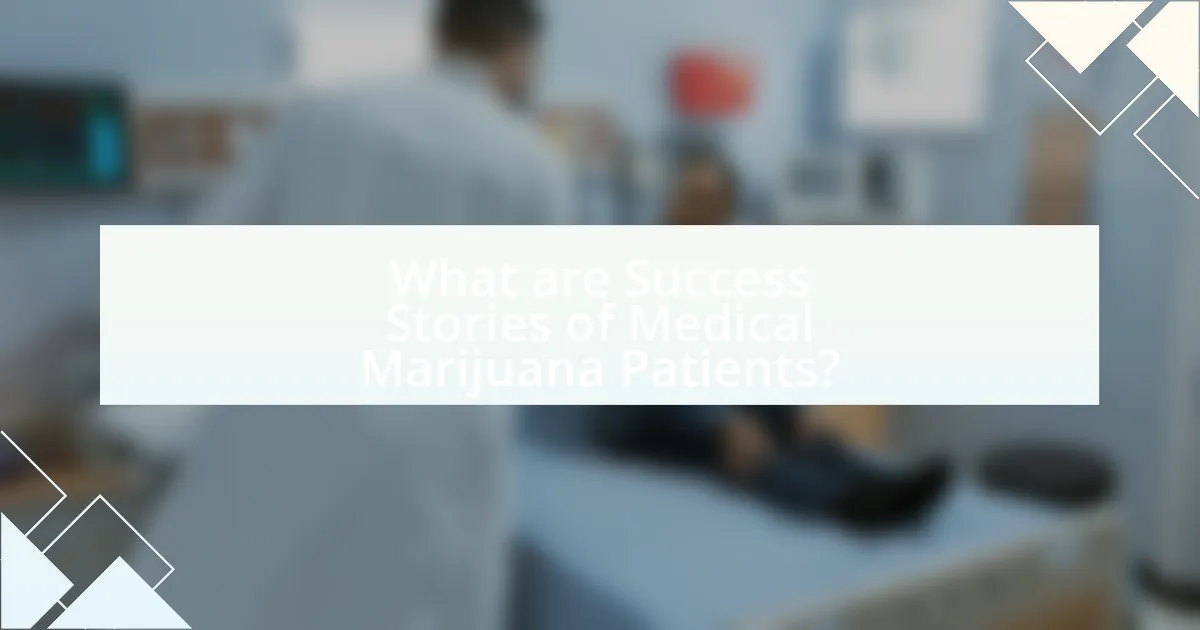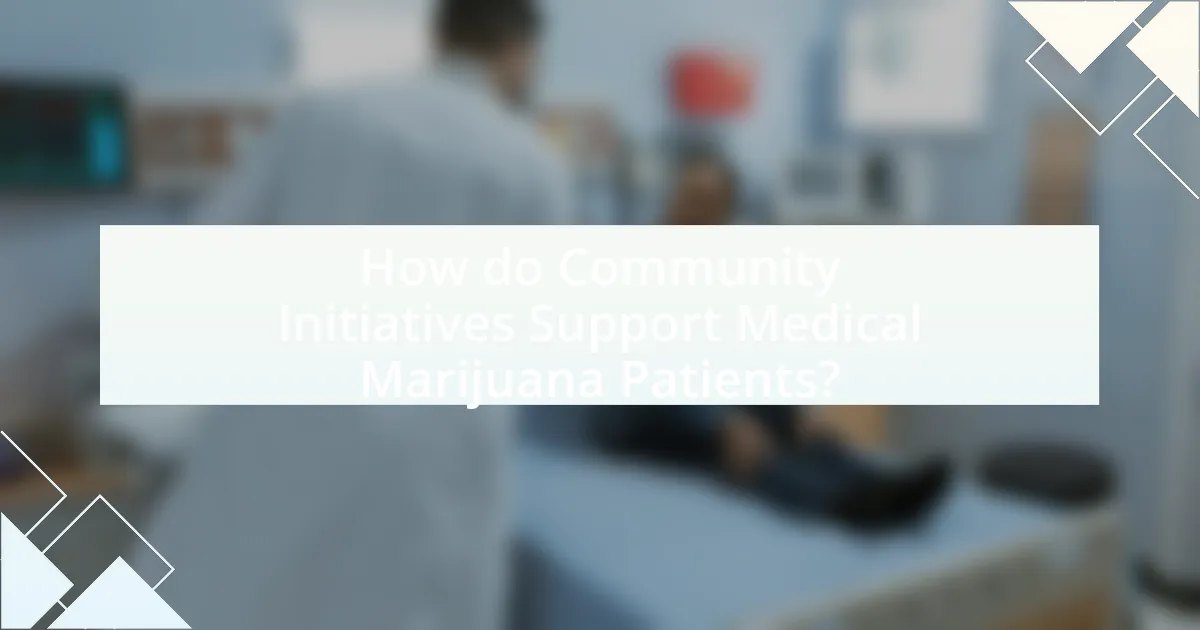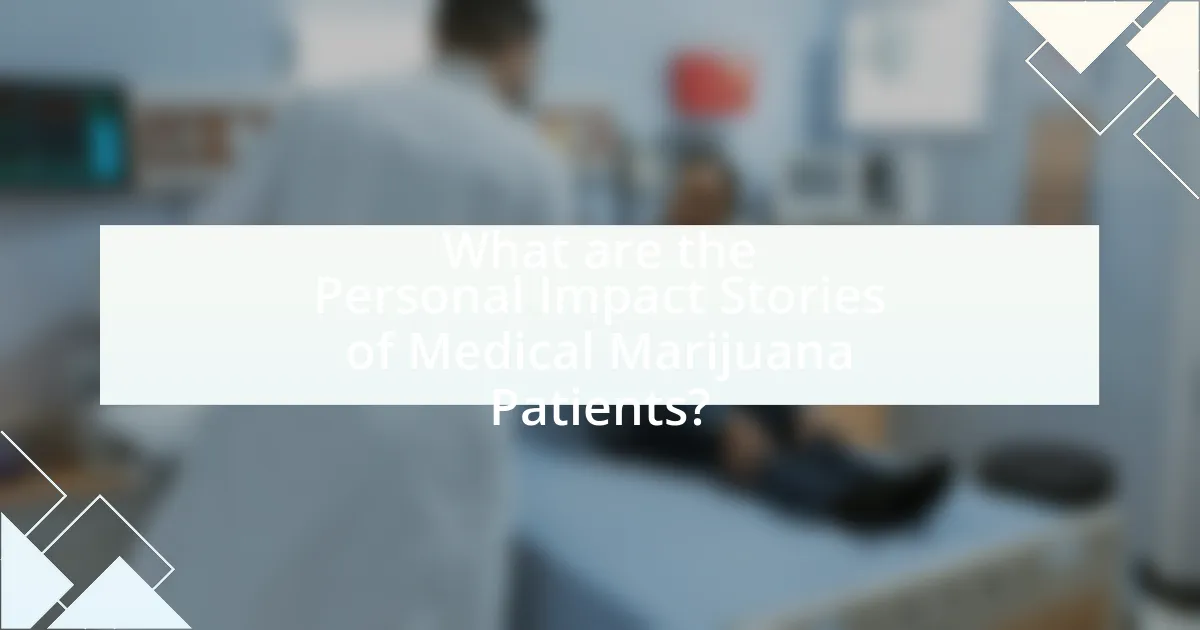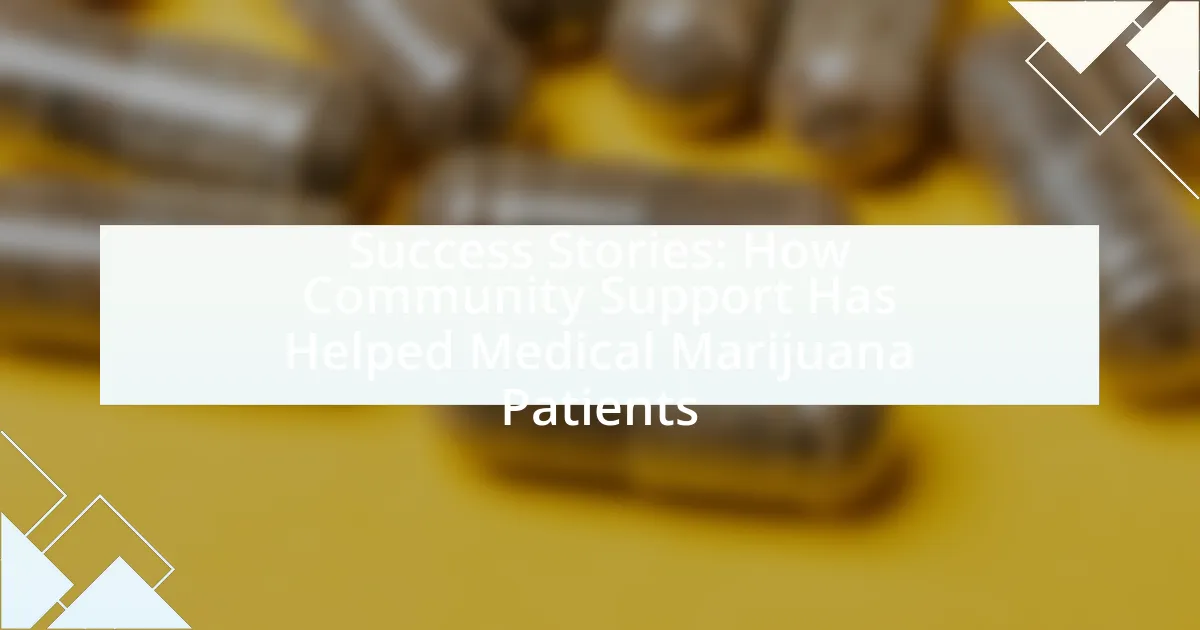The article focuses on the success stories of medical marijuana patients and the critical role community support plays in their treatment journeys. It highlights significant improvements in managing chronic pain, reducing seizures, and alleviating symptoms of anxiety and PTSD, supported by research findings. The article discusses various forms of community support, including emotional support groups, educational initiatives, and local advocacy efforts, which enhance patient well-being and treatment adherence. Additionally, it addresses the challenges faced by patients without community support, such as stigma and access barriers, while emphasizing the positive impact of personal connections and community initiatives on health outcomes.

What are Success Stories of Medical Marijuana Patients?
Success stories of medical marijuana patients include significant improvements in managing chronic pain, reducing seizures in epilepsy, and alleviating symptoms of anxiety and PTSD. For instance, a study published in the Journal of Pain Research found that 94% of patients reported a decrease in pain after using medical cannabis. Additionally, a case report highlighted a patient with treatment-resistant epilepsy who experienced a 50% reduction in seizure frequency after incorporating medical marijuana into their treatment plan. These examples illustrate the positive impact of medical marijuana on patients’ quality of life and symptom management.
How has community support played a role in these success stories?
Community support has been crucial in the success stories of medical marijuana patients by providing emotional, financial, and logistical assistance. For instance, local advocacy groups have organized fundraising events to help patients cover the costs of medical marijuana, which can be prohibitively expensive. Additionally, community members often share personal experiences and information about effective treatments, fostering a supportive environment that encourages patients to explore their options. Research indicates that social support networks significantly improve health outcomes, as seen in a study published in the Journal of Health and Social Behavior, which highlights the positive impact of community engagement on patient well-being.
What types of community support are most impactful for medical marijuana patients?
Emotional support groups are the most impactful type of community support for medical marijuana patients. These groups provide a safe space for patients to share experiences, reduce feelings of isolation, and foster a sense of belonging. Research indicates that emotional support can significantly improve mental health outcomes, which is crucial for patients managing chronic conditions. Additionally, educational workshops that focus on the benefits and proper usage of medical marijuana enhance patients’ understanding and empower them to make informed decisions about their treatment. Studies show that informed patients are more likely to adhere to their treatment plans, leading to better health outcomes.
How do personal connections enhance the effectiveness of community support?
Personal connections enhance the effectiveness of community support by fostering trust and collaboration among individuals. When community members share personal experiences and establish relationships, they create a supportive environment that encourages open communication and resource sharing. For instance, studies have shown that social networks significantly improve health outcomes; a 2010 study published in the American Journal of Public Health found that individuals with strong social ties are more likely to seek and receive support during health crises. This interconnectedness leads to more effective mobilization of resources, as individuals are more willing to help those they know personally, thereby increasing the overall impact of community support initiatives.
What challenges do medical marijuana patients face without community support?
Medical marijuana patients face significant challenges without community support, including social isolation, lack of access to information, and difficulties in navigating legal and medical systems. Social isolation can lead to mental health issues, as patients may feel stigmatized or unsupported in their treatment choices. The absence of community resources limits patients’ access to vital information about effective strains, dosages, and methods of consumption, which can hinder their ability to manage symptoms effectively. Furthermore, without community advocacy, patients may struggle to understand and comply with complex legal regulations surrounding medical marijuana use, potentially leading to legal repercussions or inadequate treatment. These challenges highlight the critical role that community support plays in enhancing the well-being and treatment outcomes for medical marijuana patients.
How does stigma affect the experiences of medical marijuana patients?
Stigma significantly impacts the experiences of medical marijuana patients by leading to social isolation, discrimination, and reluctance to seek necessary medical care. Patients often face negative perceptions from society, which can result in feelings of shame and anxiety about their treatment choices. Research indicates that 70% of medical marijuana users report experiencing stigma, which can deter them from openly discussing their condition and treatment with healthcare providers. This stigma not only affects their mental health but can also hinder their access to supportive communities and resources that are crucial for their well-being.
What barriers to access do patients encounter in their communities?
Patients encounter several barriers to access in their communities, including legal restrictions, lack of availability, and stigma surrounding medical marijuana. Legal restrictions often limit the number of dispensaries and the types of medical conditions eligible for treatment, which can hinder patient access. Additionally, in many areas, there may be a scarcity of licensed providers or dispensaries, making it difficult for patients to obtain the medication they need. Stigma associated with medical marijuana use can also discourage patients from seeking help or discussing their needs with healthcare providers, further complicating access to necessary treatments.

How do Community Initiatives Support Medical Marijuana Patients?
Community initiatives support medical marijuana patients by providing access to resources, education, and advocacy. These initiatives often include local organizations that offer information on legal rights, safe consumption practices, and the therapeutic benefits of medical marijuana. For instance, programs like the National Organization for the Reform of Marijuana Laws (NORML) work to educate patients about their rights and connect them with healthcare professionals who understand medical cannabis. Additionally, community support groups create networks for patients to share experiences and coping strategies, fostering a sense of belonging and reducing stigma. Research indicates that patients who engage with community initiatives report improved health outcomes and increased confidence in managing their conditions.
What types of community initiatives exist for medical marijuana patients?
Community initiatives for medical marijuana patients include support groups, educational workshops, advocacy organizations, and patient assistance programs. Support groups provide a platform for patients to share experiences and coping strategies, fostering a sense of community. Educational workshops offer information on the benefits and uses of medical marijuana, helping patients make informed decisions about their treatment. Advocacy organizations work to promote patient rights and influence legislation, ensuring access to medical marijuana. Patient assistance programs often provide financial aid or resources to help patients afford their medication. These initiatives collectively enhance the well-being and support network for medical marijuana patients.
How do support groups contribute to patient well-being?
Support groups contribute to patient well-being by providing emotional support, fostering a sense of belonging, and sharing valuable information among members. These groups create an environment where patients can express their feelings and experiences related to their health conditions, which has been shown to reduce feelings of isolation and anxiety. Research indicates that patients involved in support groups report higher levels of satisfaction with their treatment and improved coping strategies. For instance, a study published in the Journal of Psychosocial Oncology found that cancer patients participating in support groups experienced enhanced emotional well-being and better quality of life compared to those who did not engage in such communities.
What role do educational programs play in community support?
Educational programs play a crucial role in community support by providing essential information and resources that empower individuals and foster understanding. These programs educate community members about medical marijuana, its benefits, and responsible usage, which can reduce stigma and promote acceptance. For instance, research from the Journal of Cannabis Research indicates that educational initiatives significantly increase knowledge and positive attitudes towards medical marijuana, leading to greater community support for patients utilizing this treatment. By enhancing awareness and understanding, educational programs strengthen community ties and create a more supportive environment for medical marijuana patients.
How can local businesses contribute to the success of medical marijuana patients?
Local businesses can contribute to the success of medical marijuana patients by providing essential products, services, and community support tailored to their needs. For instance, local dispensaries offer high-quality medical marijuana strains and knowledgeable staff who can guide patients in selecting appropriate products for their conditions. Additionally, wellness centers and holistic health practitioners can provide complementary therapies, such as acupuncture or massage, which have been shown to alleviate symptoms associated with various medical conditions.
Moreover, local businesses can foster a supportive environment by hosting educational workshops and support groups that empower patients with information about their treatment options and legal rights. Research indicates that community engagement significantly enhances the well-being of medical marijuana patients, as it reduces stigma and promotes acceptance. By actively participating in community initiatives, local businesses not only enhance their reputation but also play a crucial role in improving the quality of life for medical marijuana patients.
What partnerships can be formed between dispensaries and community organizations?
Dispensaries can form partnerships with community organizations focused on health education, patient advocacy, and social justice initiatives. These collaborations can include joint health fairs, educational workshops on medical marijuana benefits, and support for patients navigating legal and medical systems. For instance, dispensaries may partner with local health clinics to provide resources and information to patients, enhancing community awareness and access to medical marijuana. Such partnerships have been shown to improve patient outcomes and foster a supportive environment for medical marijuana users, as evidenced by various community outreach programs that have successfully increased patient engagement and education.
How do local events raise awareness and support for medical marijuana patients?
Local events raise awareness and support for medical marijuana patients by providing a platform for education, community engagement, and advocacy. These events often feature speakers, workshops, and informational booths that inform attendees about the benefits and legal aspects of medical marijuana, thereby dispelling myths and reducing stigma. For example, a study published in the Journal of Psychoactive Drugs found that community events significantly increased knowledge about medical marijuana among participants, leading to greater acceptance and support for patients. Additionally, local events foster connections between patients, healthcare providers, and advocates, creating a supportive network that can influence policy changes and improve access to medical marijuana.

What are the Personal Impact Stories of Medical Marijuana Patients?
Personal impact stories of medical marijuana patients often highlight significant improvements in quality of life, including pain relief, reduced anxiety, and enhanced overall well-being. For instance, a study published in the Journal of Pain Research found that 94% of medical marijuana patients reported a decrease in their chronic pain levels after using cannabis. Additionally, many patients share experiences of regaining functionality in daily activities, such as a patient with multiple sclerosis who reported improved mobility and reduced muscle spasms after incorporating medical marijuana into their treatment regimen. These narratives underscore the transformative effects of medical marijuana, supported by clinical evidence demonstrating its efficacy in managing various medical conditions.
How do individual success stories illustrate the importance of community support?
Individual success stories demonstrate the importance of community support by showcasing how collective resources, encouragement, and shared experiences significantly enhance personal outcomes. For instance, medical marijuana patients often report improved health and well-being due to the backing of local advocacy groups, which provide education, access to resources, and emotional support. Research indicates that patients who engage with supportive communities experience higher levels of adherence to treatment plans and better overall health outcomes, as evidenced by a study published in the Journal of Psychoactive Drugs, which found that community involvement correlates with increased patient satisfaction and reduced feelings of isolation. This illustrates that community support not only facilitates access to medical marijuana but also fosters a sense of belonging and empowerment among patients, ultimately leading to more successful health journeys.
What specific outcomes have patients experienced due to community involvement?
Patients have experienced improved health outcomes and enhanced quality of life due to community involvement in medical marijuana initiatives. Specifically, studies indicate that patients participating in community support groups report reduced symptoms of chronic pain and anxiety, with a 2019 survey showing that 70% of respondents felt more empowered in managing their conditions through shared experiences and resources. Additionally, community involvement fosters a sense of belonging, which has been linked to better mental health outcomes, as evidenced by research published in the Journal of Psychoactive Drugs, highlighting that social support significantly contributes to the overall well-being of medical marijuana patients.
How do these stories inspire others in similar situations?
These stories inspire others in similar situations by showcasing the transformative impact of community support on medical marijuana patients. For instance, individuals who have faced similar health challenges often find hope and motivation in the experiences of those who have successfully navigated their journeys with the help of their communities. Research indicates that shared narratives can foster resilience and encourage individuals to seek assistance, as seen in studies highlighting the positive effects of social support on health outcomes. By illustrating real-life examples of recovery and empowerment, these stories serve as powerful testimonials that motivate others to pursue their own paths to wellness.
What lessons can be learned from the experiences of medical marijuana patients?
The experiences of medical marijuana patients reveal the importance of community support in enhancing treatment outcomes. Patients often report that connecting with others who share similar health challenges fosters a sense of belonging and provides emotional resilience. Research indicates that social support can significantly improve mental health and overall well-being, which is crucial for patients managing chronic conditions. For instance, a study published in the Journal of Psychoactive Drugs found that patients who engaged in support groups experienced reduced anxiety and improved coping strategies. This highlights that community involvement not only aids in the emotional aspects of treatment but also contributes to better adherence to medical advice and improved health outcomes.
How can these lessons inform future community support initiatives?
Lessons from community support initiatives for medical marijuana patients can inform future efforts by highlighting the importance of tailored support systems. These systems should address specific patient needs, as evidenced by successful programs that provided personalized assistance, leading to improved health outcomes and patient satisfaction. For instance, studies have shown that community-driven approaches, such as peer support groups and educational workshops, significantly enhance patient engagement and adherence to treatment plans. By analyzing these successful models, future initiatives can implement similar strategies to foster a supportive environment that empowers patients and promotes their well-being.
What best practices can be adopted to enhance community support for patients?
To enhance community support for patients, best practices include establishing support groups, providing educational resources, and fostering partnerships with local organizations. Support groups create a safe space for patients to share experiences and receive emotional support, which has been shown to improve mental health outcomes. Educational resources, such as workshops and informational materials about medical marijuana, empower patients with knowledge, enabling them to make informed decisions about their treatment. Partnerships with local organizations, including health services and advocacy groups, can facilitate access to resources and create a network of support, as evidenced by initiatives that have successfully increased patient engagement and community involvement in healthcare.
What practical steps can communities take to better support medical marijuana patients?
Communities can better support medical marijuana patients by establishing local support groups that provide education, resources, and a sense of community. These groups can facilitate discussions about the benefits and challenges of medical marijuana use, helping patients feel less isolated and more informed. Additionally, communities can advocate for policies that ensure access to medical marijuana dispensaries, which are crucial for patients needing reliable sources of their medication. Research indicates that states with supportive community frameworks see improved health outcomes for medical marijuana patients, as access to information and resources directly correlates with patient satisfaction and adherence to treatment plans.

Leave a Reply